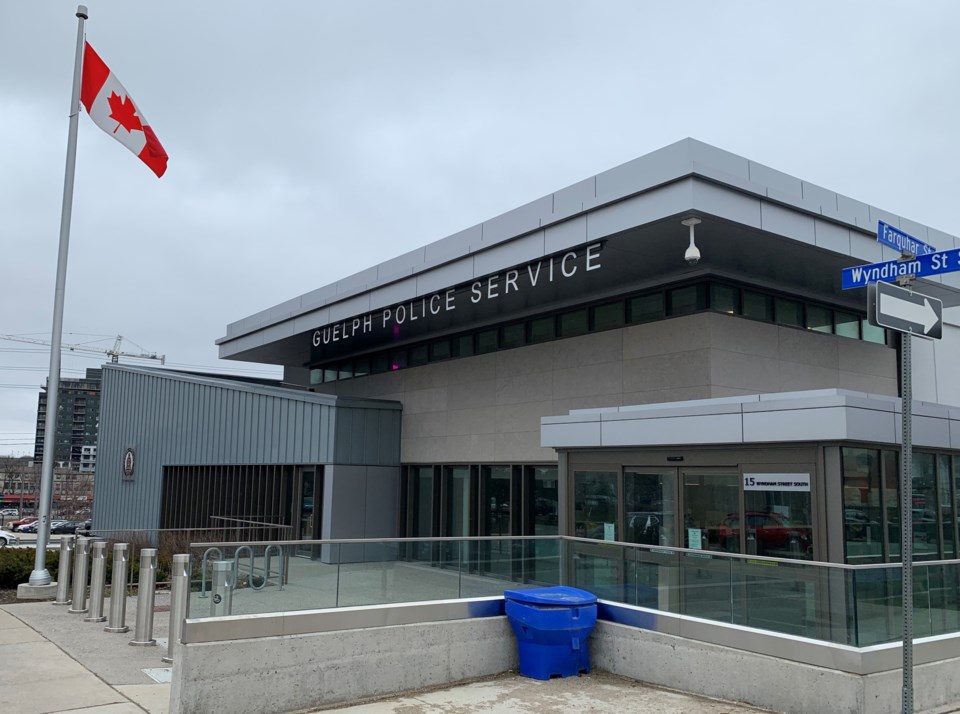A $3 million lawsuit against Guelph police and local mental health professionals should be thrown out of court, the agencies say in court filings.
Police and others involved acted “lawfully” and “in good faith” throughout a series of events that culminated in an OPP officer, who lives in Guelph, being taken into custody for a psychiatric evaluation under the Mental Health Act in January of 2021 and his legally owned guns seized, the agencies say in their statements of defence.
The OPP officer is suing for alleged abuse of public office, malicious prosecution, false imprisonment, negligent misrepresentation and more.
None of the allegations have been tested or proven in court.
In addition to Guelph Police Service, the lawsuit names Chief Gordon Coby and two constables, as well as the Canadian Mental Health Association (CMHA) Waterloo Wellington and a crisis response coordinator.
“These defendants state that this action is frivolous, vexatious and an abuse of process,” proclaims the statement of defence from Guelph police and its members. “These defendants state that there is no basis for an award of punitive damages against them.”
The lawsuit claims the CMHA crisis coordinator was “encouraged” by police to swear to "false" information that led to the OPP officer being involuntarily taken for a mental health assessment, which ended with the OPP officer being released from custody.
In its statement of defence, CMHA denies there was any “undue influence” from police and the agency conducted its own investigation into concerns raised about the OPP officer’s mental state.
The investigation looked into information provided by police, review of the man’s health history and “disclosure of some of the plaintiff’s past health history,” as well as a telephone conversation with the man directly.
“Based on the totality of the information collected, the IMPACT team reached the conclusion that the plaintiff was suffering from a mental disorder of a nature or quality that likely would result in serious harm to the plaintiff, serious bodily harm to another person and/or imminent and serious physical impairment of the plaintiff,” explains CMHA’s statement of defence.
“(The evaluation order) was completed in good faith based on an honest belief that the plaintiff was at risk of harming himself or others.”
The Integrated Mobile Police And Crisis Team (IMPACT) is a collaboration between Guelph police and CMHA which sees mental health professionals attend crisis calls alongside officers.
The lawsuit stems from an incident during which the OPP officer, whose has been on medical leave since 2013, approached paramedics in a restaurant parking lot and asked what they knew about a blood-clotting product he’d recently purchased.
Paramedics subsequently reported the inquiry to police, leading officers to visit the man’s home about two weeks later. During that visit, investigators spoke with the man and his two daughters. They also inspected his gun safe but didn’t seize any weapons at the time.
Police acknowledge in its statement of defence that the man was cooperative throughout the visit.
The IMPACT investigation continued, leading to CMHA officials applying for and receiving an order from a justice of the peace requiring the man to undergo a mental health evaluation.
“The psychiatrist, exercising independent clinical judgment, concluded that the plaintiff did not meet the threshold for further application of the Mental Health Act,” CMHA’s court filing explains. “The plaintiff was subsequently discharged home by the psychiatrist.”
While that assessment was underway, police seized the man’s guns and suspended his licence to legally possess them.
However, during a gun licence hearing last summer, the Crown “withdrew” that suspension.
In his statement of claim, the OPP officer says that happened after the CMHA crisis coordinator “confirmed” in testimony she was “encouraged” by police to swear to the information and “she attempted to access confidential information about (the man’s) medical history without his authority in order to manufacture grounds to support the (mental health evaluation).”
CMHA entirely denies that claim.
